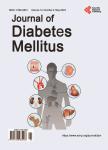Roles of the Apolipoprotein E Gene and Its Polymorphisms in the Etiopathophysiology of Type 2 Diabetes Mellitus and Its Atherosclerotic Complication in Senegalese Females
Roles of the Apolipoprotein E Gene and Its Polymorphisms in the Etiopathophysiology of Type 2 Diabetes Mellitus and Its Atherosclerotic Complication in Senegalese Females作者机构:Laboratoire de Physiologie Humaine et d’Explorations Fonctionnelles Faculté de Médecine de Pharmacie et d’Odonto-Stomatologie (FMPOS) de l’Université Cheikh Anta Diop (UCAD) Dakar Senégal IRL3189 ESS “Environnement-Santé-Sociétés” Centre National de la Recherche Scientifique (CNRS)/Centre National de la Recherche Scientifique et Technologique (CNRST) Bamako-UCAD Dakar Sénégal Laboratoire de Biochimie et de Biologie Moléculaire Faculté de Médecine de Pharmacie et d’Odonto-Stomatologie (FMPOS) de l’Université Cheikh Anta Diop (UCAD) Dakar Sénégal Service de Santé Publique Institut d’Odontologie et de Stomatologie Faculté de Médecine de Pharmacie et d’Odonto-Stomatologie (FMPOS) de l’Université Cheikh Anta Diop (UCAD) Dakar Sénégal Laboratoire de Génétique Pharmaceutique Faculté de Médecine de Pharmacie et d’Odonto-Stomatologie (FMPOS) de l’Université Cheikh Anta Diop (UCAD) Dakar Sénégal
出 版 物:《Journal of Diabetes Mellitus》 (糖尿病(英文))
年 卷 期:2023年第13卷第4期
页 面:300-324页
学科分类:1002[医学-临床医学] 100201[医学-内科学(含:心血管病、血液病、呼吸系病、消化系病、内分泌与代谢病、肾病、风湿病、传染病)] 10[医学]
主 题:APOE Gene Polymorphisms Type 2 diabetes Mellitus Vascular Dysfunctions
摘 要:Lipid metabolism disorders would be among the components responsible for the risk of the onset of T2DM and its vascular complications. Apolipoprotein E plays an important role in lipid metabolism. We studied the involvement of the APOE gene in the onset of T2DM and its vascular complications. Clinical and biochemical parameters were assessed in each participant. APOE genotypes were identified by PCR-RFLP. Arterial stiffness was studied using a pOpmetre® which evaluates the pulse wave velocity (ft-PWV). Endothelial dysfunction was studied using an EndoPAT2000® which measures endothelium-dependent vasodilation (RHI). In control subjects, the ε3 allele was associated with an increase in fasting blood glucose (r = 2.36, p = 0.018), and a decrease in LDL cholesterol levels (r = −2.17, p = 0.03), and ε4 was associated with an increase in total cholesterol (r = 2.59, p = 0.01), LDL cholesterol (r = 2.84, p = 0.004), and No-HDL cholesterol (r = 2.74, p = 0.006). In type 2 diabetes subjects, the ε2 was associated with a decrease in diastolic blood pressure (r = −2.25, p = 0.02). The ε3 was associated with a decrease in ft-PWV (r = −2.26, p = 0.024) while the ε4 was associated with an increase in ft-PWV (r = 2.52, p = 0.012). Carrying the ε2ε3 genotype would have in 99% a limited risk of developing T2DM, and in event of T2DM, only 1 to 2% would have a significant risk of developing atherosclerosis, which would be severe in 17%. Of the ε2ε4 genotype, 93% had a limited or even possible risk of developing T2DM, the remaining 7% had a very high risk of developing T2DM. Diabetics carrying ε2ε4 had in 7% very high risk of developing atherosclerosis. The latter had a 20% very high risk of being very severe. Subjects carrying the ε3ε4 genotype had a 67% possible or even probable risk of developing T2DM and in the event of diabetes, there was in 34% very high risk of developing atherosclerosis which will not have even the time to evolve towards severity. For subj



